
Google announced today that it is officially switching to a human-driven app review process for the Google Play store, a move intended to "better protect the community" and "improve the app catalog." Google's "team of experts" will be checking apps and updates submitted to Google Play for violations of Google's developer policies and giving developers specific feedback on what they need to fix before their apps will be listed.
Google says it began this review process "several months ago" and that "there has been no noticeable change for developers during the rollout." Today's post simply serves as an official announcement of the new policy. An improved review status page will give developers "more insight into why apps were rejected or suspended" and will allow them to "easily fix and resubmit their apps for minor policy violations."
Apple has had a team of real humans evaluating third-party app submissions since the dawn of the App Store, but the Android Market (now Google Play) was more permissive—aside from some automated malware scanning, Google didn't do much to make sure apps worked like they were supposed to and did what they said they did. The Google Play store had apps that did more things, but the quality and security of those apps could be all over the place. Google's app review process will ostensibly fix that problem.
Nobody really objects to a review process that filters out malware and busted apps, and Google seems committed to a quick and transparent review process. This has occasionally been a problem for iOS developers—Apple's review process takes about a week on average, while Google promises reviews "within a matter of hours."
The larger concerns about the so-called "walled garden" approach involve the filtering of content, particularly when it comes to creative works (one person's "objectionable" is another person's "art"). The problem is exacerbated when the rules about objectionable content are applied inconsistently—it's easy to find examples of apps that were initially rejected only to be reinstated at some later date. Google will need time to establish a track record here.
Alongside the app review announcement, Google announced that it's working with the ESRB, PEGI, and other organizations to assign age ratings to apps in the Play Store. Developers are being asked to sign into the Android developer console to fill out questionnaires about their apps so that ratings can be assigned accordingly; this is optional for now but will become mandatory for all new app and update submissions in May. "Unrated" apps "may be blocked in certain territories or for specific users." Apple added a similar rating system for apps in early 2013 and has been tweaking it since.
reader comments
63